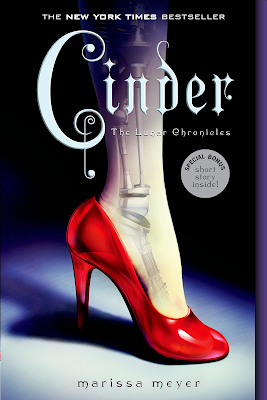Review: The Stolen Kingdom
The Stolen Kingdom is a retelling of "Aladdin" by Bethany Atazadeh. It was recommended to me by one of my readers. Praising it can feel a little self-indulgent due to the many coincidental similarities it has to my own book, The Stolen Jewel. That said, I found the setting and story of The Stolen Kingdom very enjoyable overall. Even though it focuses on the princess from the tale, it is not a gender-bent "Aladdin" retelling like Lucy Tempest's Thief of Cahraman trilogy. It switches to the "Aladdin" character, whose name in this version was Kadin, later in the story. Similar to the Tangled novelizations, the character whose perspective you're reading from changes depending on the chapter. This can get a little jarring because their inner voices weren't all that different even thought their personalities were. I had to go back a few times to check which character was telling the story in that chapter. Aside from that minor nitpick, it is a unique adaptation of "Aladdin" that incorporates a lot of elements I haven't seen in other retellings.
The Stolen Kingdom starts from the perspective of Princess Arie, who was born with the ability to read minds. Arie struggles to hide this ability from the world because she lives in a patriarchy that punishes women who were born with powers even though celebrates men who possess them, especially royals. After reading so many stories about princesses whose independence is celebrated by their society, it was surprisingly difficult to readjust to such an outdated mindset. That's not necessarily think that's a bad thing. In fact, it's refreshing to read about a princess trying to survive in a world that isn't ready to accept her. She learns fairly early in the book that she possesses this ability because of Jinni blood from her late mother's side, but this never gets explored in as much detail as I would have liked. Arie's ability helps her to uncover the plot of an evil king with the power of mind control who wants to use his powers to force her to marry him and take over her kingdom. Arie runs away to try to find a way to stop him and encounters a handsome thief named Kadin along the way. She uses her ability to learn that her goal of finding a Jinni aligns with his, so she teams up with Kadin and his band of thieves. After that, the book's first person perspective shifts between Arie and Kadin, but not necessarily in every chapter.
Jinnis in this story behave differently from the ones Aladdin meets in the original fairy tale. Instead of granting wishes, they are gifted with incredible power that they are bound by law to use for the good of mankind. This creates a challenge for both Arie and Kadin when they track down a Jinni named Gideon. They get Gideon on their side by purchasing an oil lamp that he covets in an auction, even though they don't know exactly what the lamp does. Kadin uses the lamp as collateral for Gideon to punish a wicked prince that he believes is responsible for his brother's death. Gideon picks up on Arie's Jinni blood immediately, but Arie begs him not to tell anyone for the sake of her life. When she learns about Kadin's prejudice toward people with powers, or "Gifts," it becomes even more vital for Arie to keep her ability a secret. I liked how this book put a new twist on the classic theme of being yourself. While Disney's Aladdin was ashamed of being poor, something that is generally seen as a bad thing, Arie is ashamed of being a princess and having a magical ability, things that are generally seen as a good. This gave her character a healthy amount of humility and proficiency for her quest.
There's a lot to love about the world of The Stolen Kingdom. Even though it contains fantasy beings that most of us are already familiar with, it twists what we think we know into something new, giving us something to explore around every corner. Jinnis don't live in rings or lamps in this world nor do they exist for the sole purpose of granting wishes. Princes and kings who abuse their Jinni-given "Gifts" are punished by the Jinn, while women who are discovered to have them are punished by the human monarchy. I would have liked to see the book dive into more of an explanation of Arie's powers and Jinni blood, but I suppose the author is saving that for a later book. The Stolen Kingdom also introduces a race of mermaids called "Meremaids" who live in the ocean and are adorably ignorant about human customs. The end of the book contains a cameo of Rena, the "Little Mermaid" character featured The Jinni Key, the second book in the series. Rena's persistence in following Arie and seeking out sparkly dresses and jewels was just as endearing as it was irritating.
Even though I found The Stolen Kingdom enjoyable overall, the ending fell a little flat. I suppose Bethany Atazadeh wanted to give us a reason read the next book, but it didn't quite have the fairy tale ending I was expecting. The love story between Arie and Kadin is cute and reminds me a the Disney movie, though it never quite reached the same level of passion and charm. Arie falls for Kadin's straightforwardness that confuses her mind reading ability the first time she meets him, while Kadin likes Arie's assertiveness that comes from her upbringing as a princess. The heart of the story revolves not around the romance, but Arie learning to accept her powers and her station in her kingdom. The Stolen Kingdom contains a lovely and engaging fantasy world that any princess fan would love to dive into. I'm looking forward to reading The Jinni Key next to learn more about the Meremaids and discover Rena's story. Hopefully, Arie's tale gets a more fulfilling resolution there as well.
The Stolen Kingdom starts from the perspective of Princess Arie, who was born with the ability to read minds. Arie struggles to hide this ability from the world because she lives in a patriarchy that punishes women who were born with powers even though celebrates men who possess them, especially royals. After reading so many stories about princesses whose independence is celebrated by their society, it was surprisingly difficult to readjust to such an outdated mindset. That's not necessarily think that's a bad thing. In fact, it's refreshing to read about a princess trying to survive in a world that isn't ready to accept her. She learns fairly early in the book that she possesses this ability because of Jinni blood from her late mother's side, but this never gets explored in as much detail as I would have liked. Arie's ability helps her to uncover the plot of an evil king with the power of mind control who wants to use his powers to force her to marry him and take over her kingdom. Arie runs away to try to find a way to stop him and encounters a handsome thief named Kadin along the way. She uses her ability to learn that her goal of finding a Jinni aligns with his, so she teams up with Kadin and his band of thieves. After that, the book's first person perspective shifts between Arie and Kadin, but not necessarily in every chapter.
Jinnis in this story behave differently from the ones Aladdin meets in the original fairy tale. Instead of granting wishes, they are gifted with incredible power that they are bound by law to use for the good of mankind. This creates a challenge for both Arie and Kadin when they track down a Jinni named Gideon. They get Gideon on their side by purchasing an oil lamp that he covets in an auction, even though they don't know exactly what the lamp does. Kadin uses the lamp as collateral for Gideon to punish a wicked prince that he believes is responsible for his brother's death. Gideon picks up on Arie's Jinni blood immediately, but Arie begs him not to tell anyone for the sake of her life. When she learns about Kadin's prejudice toward people with powers, or "Gifts," it becomes even more vital for Arie to keep her ability a secret. I liked how this book put a new twist on the classic theme of being yourself. While Disney's Aladdin was ashamed of being poor, something that is generally seen as a bad thing, Arie is ashamed of being a princess and having a magical ability, things that are generally seen as a good. This gave her character a healthy amount of humility and proficiency for her quest.
There's a lot to love about the world of The Stolen Kingdom. Even though it contains fantasy beings that most of us are already familiar with, it twists what we think we know into something new, giving us something to explore around every corner. Jinnis don't live in rings or lamps in this world nor do they exist for the sole purpose of granting wishes. Princes and kings who abuse their Jinni-given "Gifts" are punished by the Jinn, while women who are discovered to have them are punished by the human monarchy. I would have liked to see the book dive into more of an explanation of Arie's powers and Jinni blood, but I suppose the author is saving that for a later book. The Stolen Kingdom also introduces a race of mermaids called "Meremaids" who live in the ocean and are adorably ignorant about human customs. The end of the book contains a cameo of Rena, the "Little Mermaid" character featured The Jinni Key, the second book in the series. Rena's persistence in following Arie and seeking out sparkly dresses and jewels was just as endearing as it was irritating.
Even though I found The Stolen Kingdom enjoyable overall, the ending fell a little flat. I suppose Bethany Atazadeh wanted to give us a reason read the next book, but it didn't quite have the fairy tale ending I was expecting. The love story between Arie and Kadin is cute and reminds me a the Disney movie, though it never quite reached the same level of passion and charm. Arie falls for Kadin's straightforwardness that confuses her mind reading ability the first time she meets him, while Kadin likes Arie's assertiveness that comes from her upbringing as a princess. The heart of the story revolves not around the romance, but Arie learning to accept her powers and her station in her kingdom. The Stolen Kingdom contains a lovely and engaging fantasy world that any princess fan would love to dive into. I'm looking forward to reading The Jinni Key next to learn more about the Meremaids and discover Rena's story. Hopefully, Arie's tale gets a more fulfilling resolution there as well.












Comments